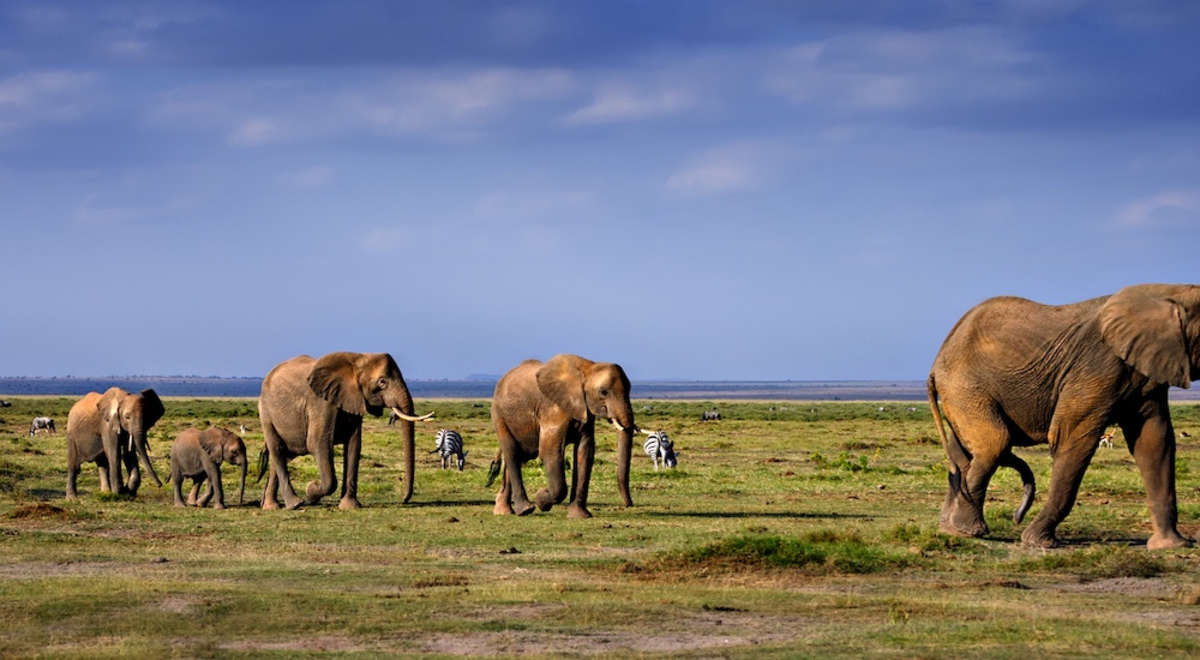
You’ve decided to visit Africa, but you’re concerned about how to do it responsibly. Follow these tips to minimise your footprint, be a thoughtful guest, and contribute positively to your amazing destination.
Keep it local
Once you’ve arrived in Africa, look for ways to support on-the-ground businesses in order to keep valuable tourism income in local hands. Local restaurants should be on your to-do list, for example, however good your hotel’s in-house food offerings. Ask the manager for tips or recommendations – what to eat and where the best place to find it is – and don’t be afraid to ask your waiter about their house specialty. Depending on where you are, you may find yourself faced with a gourmet feast or tucking into more rustic local dishes.
When you’re souvenir-shopping, try to buy direct from artists and craftspeople. Most hotels will be able to connect you to an arts-and-crafts tour if you want to see where your trinkets and treasures are made; otherwise, head to the marketplace, and don’t be afraid to do a little (friendly) bargaining.

Choose ethical animal experiences
Doing your homework – on your own, and with the help of your Flight Centre travel expert – will pay dividends when it comes to choosing a safari. The operators Flight Centre work with are genuinely concerned with the wellbeing of animals, and with conservation more generally, so if you are unsure talk to them first. Be aware that animal “encounters,” where tourists are given the opportunity to spend time one-on-one with animals, are often exhausting for the animals involved. Virtually all direct encounters with leopards or lions, including petting cubs or walking with adults, are not ethical and may involve the animals being sedated.
But it’s not all bleak. Many safari companies do promote responsible travel and are committed to conservation. Tourist income can make a valuable contribution if it’s spent supporting the right missions. Look out in particular for safari experiences on conservancies – areas of land where local people are practicing environmental conservation and responsible tourism. Conservancies were first pioneered in Namibia and have since spread to South Africa and many other southern African nations.

While on safari, consider opting for companies with a stated interest in African lion conservation. There are only about 20,000 of these amazing animals left in the wild, with half the world’s population wiped out in the past 25 years. While on safari, don’t use flash photography, never ask your guide to chase wildlife or leave the trail, and follow all rules to the letter. They’re almost always for your own safety.

Put the environment first
Water is a scant and valuable commodity in many African nations. Take quick showers, reuse your hotel towels, and do what you can to avoid wasting it. If you’re camping or washing outdoors, bring biodegradable toiletries, and make sure to take any litter away with you. Normal chemicals may contaminate local water supplies or poison sensitive wildlife. As you travel around the continent, choose land travel over air wherever possible to minimise your carbon footprint. In Morocco, for instance, trains are fast, convenient, and air-conditioned – and much easier on the planet.
When talking to your Flight Centre travel expert, ask them about options with a commitment to recycling and supporting the environment. Some examples might include using solar power, giving waste wood to local craftspeople to sculpt, or installing water filtration systems that make wastewater safe for surrounding animals to drink. Though many hotels and businesses may tout their “eco-tourist” credentials, take a sceptical eye and look for proven results over flashy copywriting.

Support tribal rights
If you’re interested in learning more about Africa’s tribes, talk to Flight Centre about safari companies that work with indigenous people. In Kenya, for instance, certain companies lease Masai land and employ its people as guides, who may be able to provide more profound insight into their land and its history. Remember that these tribespeople are not simply attractions to gawp at or photograph, but people who may be just as interested in you as you are in them. Introduce yourself and ask permission if you’d like to take someone’s picture.
Seek out experiences that give tribespeople a say over how best to celebrate their culture and put education at the forefront, rather than simple snap-and-go excursions into tribal lands. Living culture museums are often one of the best ways for tourists to learn about indigenous culture and history in a non-exploitative way. These experiences may also be a fantastic opportunity to bring home souvenirs while supporting local artists and craftspeople.

Be considerate and sensitive
You’re on holiday – but you’re also in someone else’s home. Familiarise yourself with appropriate manners and customs, particularly around dress, to avoid causing offense. While some countries, like South Africa, are more progressive, others are much more conservative and expect women to cover their shoulders, legs, and midriffs. If you’re visiting religious sites, bring a shawl to cover your head, and be prepared to remove your shoes if asked.
Remember to thank your guides, drivers, cooks and hotel staff, and bring cash tips to show your appreciation (tour operators can usually give you a sense of how much is appropriate to give). Even small contributions may make a big difference to people living in the world’s poorest nations. Finally, respond to the hospitality you receive with gratitude and grace, even if it doesn’t always go exactly according to plan. Don’t expect everything to be as it is at home – and try to be the most considerate version of yourself if it isn’t. A smile and thanks can go a long way to being a responsible, pleasant guest.

+ Worldwise - Flight Centre's Commitment To Responsible Travel +
Flight Centre Travel Group is committed to promoting and selling travel that respects human rights, the environment, and social equality – we have embodied this commitment in our Responsible Travel Charter and have a passionate Worldwise Committee to oversee its implementation. Our Responsible Tourism Charter also introduces and establishes the 4 Pillars or areas where we believe our company has the best opportunity to create positive change.
These pillares are: the social pillar, the environment pillar, wildlife pillar and economic pillar.
Social Pillar: The cultural and social wellbeing of the communities where we live, work, and travel to, are vitally important to the way that we, as an organisation, go about conducting our business. As a global travel company, Flight Centre Travel Group (FCTG) is a primary stakeholder in all of the communities where we operate as well as the communities to which our customers travel. We believe that as a stakeholder we have a responsibility to respect the cultural and social wellbeing of these communities and that our unique position provides us with the ability to exert a positive influence on these communities. Our social goal is to build a brighter future in the communities where we work, live and travel, promote closer ties and respect among people and cultures, and offer a helping hand in times of need.
Environment Pillar: The protection of the environment is very important to us, not only as a company but to the individuals that make up the company. Tourism relies on resources that are fragile and must be protected. As a company, we actively manage and reduce the environmental impact of our business. We also recognise the need to support sustainable travel activities that promote environmental awareness, conserve and protect the environment, and respect wildlife, flora, biodiversity, ecosystems and cultural diversity. Our environmental goal is to support tourism activities that promote environmental awareness, conserve and protect the environment and respect wildlife.
Wildlife Pillar: The welfare of animals is very important to us, not only as a company but to the individuals that make up the company. We believe that all animals should live in a reasonable state of welfare and are committed to doing our part to make this a reality. We are engaging and will continue to engage with employees across the business to benefit from their front-line knowledge and experience. Our goal is to use our influence wherever we can to end the practice of cruel animal attractions. In pursuit of that goal we do not seek to criticise consumers interested in animal attractions, but rather to inform them about potential problems and, where appropriate, provide them with suitable alternatives. Consumers rely on us for our knowledge and experience and accordingly, we must ensure that we have taken all possible steps to understand animal welfare and how it relates to our business. Our wildlife goal is to take steps to understand and prevent animal cruelty from being a part of tourism.
Economic Pillar: The economic health of the communities to which we are connected through our business is very important to us, not only as a company, but to the people who make up the company’s vital workforce. As a global travel business, FCTG is a stakeholder in all of the communities where we operate as well as the communities to which our customers travel. We understand and accept that as a stakeholder we have a responsibility to respect the economic wellbeing of these communities and that our unique position provides us with the ability to positively influence these communities. Our Economic goal is to make a positive contribution to the economies of the destinations where we work, live and travel, and ensure that there is equal sharing of the benefits and burdens of tourism.
Site quick links
Help & support
Flight Centre acknowledges the Traditional Custodians of Country throughout Australia.
© Flight Centre Travel Group Limited. ATIA Accreditation No. A10412.
*Travel restrictions & conditions apply. Review any specific conditions stated and our general terms at Terms and Conditions. Prices & taxes are correct as at the date of publication & are subject to availability and change without notice. Prices quoted are on sale until the dates specified unless otherwise stated or sold out prior. Prices are per person.






